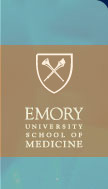



Summer 2007
Graduation
recap
Editor's note: The June issue was already in press at the time
of the SOM graduation. We wanted to take this opportunity to recap Dr.
Lawley's commencement address on May 14, the date of which marked
the 35th anniversary of his own graduation from medical school (SUNY-Buffalo).
His remarks to the class of 2007 follow.
Welcome to all of you—you, our newest doctors, and to the families
and friends who rightly share the sense of accomplishment that permeates
this day.
Graduation is always a milestone for medical
school faculty. For four years you have been their life's work,
and today they appear to be thinking it was worth every minute. I hope
that as you move through your lives, you will make it clear to them, and
to your parents, spouses, loved ones, and communities, that you believe
in yourself as much as they believe in you.
This graduation is also a milestone for
me. Exactly 35 years ago this month, I was sitting where you are, wishing
the graduation speaker would speed it up a bit so I could recite the Hippocratic
Oath and begin my life as a real doctor. I must confess that I remember
very little about my medical school graduation. I only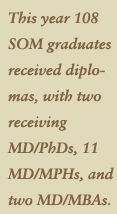 remember how proud my parents and my wife were and that I couldn't
quite believe that I had done it despite the fact that I had never diagnosed
a patient or written a prescription completely on my own and yet, I was
a doctor—WOW! How did that happen? I knew how little I really knew,
how much I needed a lot of supervision, how much I'd forgotten already,
and how fast those four years had gone by. I suppose those 35 subsequent
years as physician, researcher, and teacher of doctors enables me to look
at the class of 2007 with a certain hard-earned wisdom and perspective.
remember how proud my parents and my wife were and that I couldn't
quite believe that I had done it despite the fact that I had never diagnosed
a patient or written a prescription completely on my own and yet, I was
a doctor—WOW! How did that happen? I knew how little I really knew,
how much I needed a lot of supervision, how much I'd forgotten already,
and how fast those four years had gone by. I suppose those 35 subsequent
years as physician, researcher, and teacher of doctors enables me to look
at the class of 2007 with a certain hard-earned wisdom and perspective.
Let me tell you without exaggeration, you
are the most knowledgeable new physicians in history. You have been given
knowledge that did not even exist when I was a freshly minted doctor.
I could speak for hours, but I won't,
about the seemingly endless flood of discovery that has changed our view
of health and disease over the past 35 years. I will mention two examples.
First, the most important, medicine-changing undertaking mankind has ever
attempted: the human genome project, the mapping of every gene in the
human body as well as that of many of our fellow species. And second,
the mapping of every protein produced by those genes, proteins being what
actually do the body's work. These new discoveries in genomics and
proteomics mean that you, the class of 2007, are among the first physicians
to come to professional age with access to the full script of the human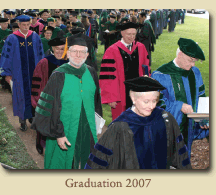 instruction book, and they are already changing how we can diagnose, treat,
and prevent diseases.
instruction book, and they are already changing how we can diagnose, treat,
and prevent diseases.
But perhaps the most important new tools
at your disposal are those of the electronic revolution, especially the
electronic capture of clinical information and the high-speed analysis
of massive amounts of individual data that were unthinkable when I entered
medicine. I was in a meeting recently when someone referred to the electronic
medical record as the stethoscope of the 21st century. Think about that!
The electronic medical record allows a physician
to pair a patient's entire medical history to the most current scientific
and clinical information available. For those of us who began medical
practice relying on our own knowledge and experience, it seems an incredible
tool. For us, medical decisions had to be based on what we had learned
and the experiences of our colleagues. For you, the doctors of tomorrow,
medical decisions are and will be evidence-based, diminishing variability
among doctors and helping make you master diagnosticians and physicians.
The real miracle of the electronic medical
record is how researchers and epidemiologists can now combine information
on millions of patients to see connections that were invisible in smaller
numbers. To illustrate, in oncology, decisions about what type of chemotherapy
to give an individual are no longer made on a one-size-fits-all basis,
but on which drug we can see is most effective for vast scores of patients
who have similar disease characteristics, genetics, and prior treatment.
With this new "stethoscope"
of electronic databases and computer access, you, the class of 2007, have
incredible power: power to cure patients once considered incurable and
power to understand the causes of diseases only recently hidden in thickets of
impenetrable data. As time goes by you will help medicine move forward
in ways, and with a velocity, unthinkable only a few years ago.
understand the causes of diseases only recently hidden in thickets of
impenetrable data. As time goes by you will help medicine move forward
in ways, and with a velocity, unthinkable only a few years ago.
But there are two bits of bad news that
come with this knowledge and power. The first is that with this amazing
technology comes daunting responsibility: issues of privacy and protection
of confidential information, certainly, but also the need to assure that
technology never replaces the close doctor-patient relationship that has
led so many of us to choose and cherish this profession. Years ago, when
available technology was only a fraction of what you have today, Albert
Schweitzer said we must always take care that our technology does not
exceed our humanity. It has never been truer than today.
Retaining the deep humanity of medicine
will be up to you, in the same way that advances of technology are up
to you, and I believe your training and experiences at Emory assure that
you will never lose sight of that age-old covenant between doctor and
patient. Far more than was true for my generation, you have been given
a deep appreciation for the complex sociological, psychological, and economic
issues surrounding patients, families, and communities. You have gained
important insights from diverse communities that Emory serves, especially
at Grady Memorial Hospital, and you have been mentored by faculty who
understand both medicine and public health. For you, patients have never
been—and will never be—"the kidney in bed three."
They will never be only some collection of data.
I said earlier that you are, without exaggeration,
the most knowledgeable new physicians in history. Keep in mind that the
class of 2008 is going to graduate with even more knowledge, and you are
going to have to keep up with them and with each class that follows. William
Welch, the great medical educator, said a century ago, "Medical
education is not completed at the medical school—it is only begun."
While at Emory, you learned a lot of stuff.
(In memory of some of those late, late nights required to study all that
"stuff," let me quote another 20th century medical scholar,
Chevalier Jackson, who once said in teaching medical students, the primary
requisite is to keep them awake.) Yes, you learned a lot, but even more
important, you also learned how to learn and keep learning. Given the
explosion of scientific knowledge today, these skills will be more and
more critical as time goes by.
Dr. Francis Collins, the head of the Human
Genome Project, is said to have told a graduation audience that "the
kind of wisdom conveyed in commencement addresses tends to have a half-life
measured in milliseconds." Even so, I am going to conclude by giving
you two pieces of advice from my own life.
First, and this is much harder to do than
it sounds, seek out a balanced life. Medicine is a profession so humanly
and intellectually interesting and so demanding that it is sometimes hard
to turn away from its siren song. But you will be better doctors, as well
as better humans, if you develop a balanced life, if you spend time and
energy on your family and community, if you learn to appreciate beauty
and interests outside of medicine. Listen to the music of life.
Second, stay open. Some of you knew you
were going to be doctors from before you can remember, and some of you
believe that when you complete your residency, your life is set forever.
But there will be many moments and opportunities in life, in your life,
that you can't even imagine now. I thought that I would go to medical
school in my hometown of Buffalo, NY, be a resident in some specialty
in Buffalo, and then go into private practice in a suburb of Buffalo.
I did almost none of those things, and I'm so glad I didn't.
I took advantage of opportunities that were presented to me, and I never
looked back.
In medical school, I had virtually no interest
in research. After all, I was going to be the ultimate clinician. But
when I started training in dermatology at Yale, I began to realize there
were so many unanswered questions about disease, and it frustrated me to no end.
After my second year of residency, I took a research fellowship at the
National Cancer Institute—what I assumed was going to be a slight
detour from my set-upon path—and ended up staying at NCI for 13
years. I could not have been happier doing what I was doing, answering
some of those unanswered questions and training young scientists. I assumed
I would be a researcher my entire professional life and had no interest
in administration.
many unanswered questions about disease, and it frustrated me to no end.
After my second year of residency, I took a research fellowship at the
National Cancer Institute—what I assumed was going to be a slight
detour from my set-upon path—and ended up staying at NCI for 13
years. I could not have been happier doing what I was doing, answering
some of those unanswered questions and training young scientists. I assumed
I would be a researcher my entire professional life and had no interest
in administration.
When I decided to leave the National Institutes
of Health and a research-focused life to become chair of dermatology at
Emory, most of my research colleagues thought I was crazy—and of
course there were days I agreed with them. But academic medicine, first
as chair for eight years, then as dean these past 11 years, has been the
most exciting adventure I could imagine, one that grows more exciting
every year, in large part because of what we now have to offer young doctors-to-be
such as yourselves.
The reason I tell you this story is that
I hope you too will remain open to the many options that your own lives
will hold. There will be forks in the road, and you should at least pause
and try to imagine what would be possible down that path. As Yogi Berra
said, "When you reach a fork in the road, take it."
Some final thoughts:
Never stop learning. The scientific and
medical world is changing even as we sit here today, and in some laboratory
or clinical research project something is happening that will change what
you learned last week and how you will handle your patients next week.
Never forget what brought you to medicine,
no matter how powerful the technology and science in medicine becomes.
Stay true to what you know today: medicine is about taking care of people,
not treating diseases.
Be good to the least fortunate because how
you treat them is an indicator of the quality of your character.
Know this: the happiest people I know in
medicine are those who give back every day. They don't drive fancy
cars or have big offices, but they have big dreams, and they accomplish
them one patient, one student, or one experiment at a time.
And finally, leave here today knowing that
you are among the finest, best prepared doctors for which the world could
ask, that you are the kind of doctors the world needs so badly, and that
we, your teachers, and now your colleagues, could not be more proud of
you.
Congratulations. Go be great doctors and
great human beings. You have what it takes on all counts.
TOP
Fred Sanfilippo to Lead Health Sciences
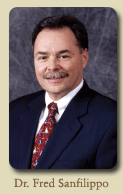 My
colleagues and I look forward to working with Fred Sanfilippo,
MD, PhD, a transplant immunologist whom Emory University named
in late July to lead its own health care enterprise.
My
colleagues and I look forward to working with Fred Sanfilippo,
MD, PhD, a transplant immunologist whom Emory University named
in late July to lead its own health care enterprise.
Dr. Sanfilippo will succeed Michael M.E.
Johns, MD, as executive vice president for health affairs, CEO of the
Woodruff Health Sciences Center, and chairman of the board of Emory Healthcare.
The appointment is effective October 1,
at which time Dr. Johns will assume the position of Chancellor of Emory
University.
Dr. Sanfilippo currently serves as senior
vice president and executive dean for health sciences at Ohio State and
as CEO of the Ohio State University Medical Center.
TOP
Leadership development in pediatrics
One of the first objectives Dr. Barbara Stoll had in
late 2004 as newly minted Chair of the Department of Pediatrics was to
get the department's diverse group of physicians, researchers,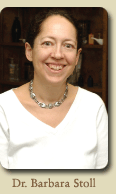 administrators, and staff together on the same page, whether they work
in the Emory Children's Center or elsewhere. "We conducted
a survey," says Dr. Lucky Jain, Executive Vice
Chair and an MBA graduate from the Goizueta Business School, "and
found that faculty and administrators want an environment in which every
individual is a leader, there is business and financial training to make
their work lives more effective, and patient services are provided with
unsurpassed quality." As a result, Dr. Jain launched the Pediatric
Executive Program (PEP), an extension of the Woodruff Leadership Academy
(created in 2003 by Dr. Michael Johns, CEO of WHSC and
soon to be chancellor of the University) to help develop and strengthen
individual leadership and foster collegiality and teamwork in the department.
In May, PEP's third class had 20 graduates.
administrators, and staff together on the same page, whether they work
in the Emory Children's Center or elsewhere. "We conducted
a survey," says Dr. Lucky Jain, Executive Vice
Chair and an MBA graduate from the Goizueta Business School, "and
found that faculty and administrators want an environment in which every
individual is a leader, there is business and financial training to make
their work lives more effective, and patient services are provided with
unsurpassed quality." As a result, Dr. Jain launched the Pediatric
Executive Program (PEP), an extension of the Woodruff Leadership Academy
(created in 2003 by Dr. Michael Johns, CEO of WHSC and
soon to be chancellor of the University) to help develop and strengthen
individual leadership and foster collegiality and teamwork in the department.
In May, PEP's third class had 20 graduates.
Through monthly weekend workshops and weekly
breakfast meetings from January to May each year, participants gain a
better understanding of the mission, vision, and strategic plan for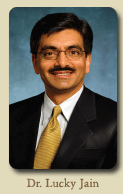 the department, the SOM, the university, and for Children's Healthcare
of Atlanta. Department faculty and managers, WHSC and SOM administrators,
and Goizueta Business School lecturers provide valuable information on
topics such as leadership development, finance, accounting, marketing,
development, conflict resolution, and personal and organizational change.
Participants have required reading and, this year, prepared two team debates
at the end of the course. "One team debated the pros and cons of
a stringent conflict of interest policy," says Dr. Jain. "It
was moderated by Brenda Seiton [SOM Assistant Dean] and
Dr. Claudia Adkison [Executive Associate Dean and a key
presenter for PEP]. The second debatecentered on the changes at Hughes
Spalding Children's Hospital, which is under new leadership under
Children's. We thought this debate would be quite spirited, and
it turned out to be one of the most constructive the program has had."
the department, the SOM, the university, and for Children's Healthcare
of Atlanta. Department faculty and managers, WHSC and SOM administrators,
and Goizueta Business School lecturers provide valuable information on
topics such as leadership development, finance, accounting, marketing,
development, conflict resolution, and personal and organizational change.
Participants have required reading and, this year, prepared two team debates
at the end of the course. "One team debated the pros and cons of
a stringent conflict of interest policy," says Dr. Jain. "It
was moderated by Brenda Seiton [SOM Assistant Dean] and
Dr. Claudia Adkison [Executive Associate Dean and a key
presenter for PEP]. The second debatecentered on the changes at Hughes
Spalding Children's Hospital, which is under new leadership under
Children's. We thought this debate would be quite spirited, and
it turned out to be one of the most constructive the program has had."
PEP has encouraged many changes in the department.
For example, faculty and staff are paying much more attention to monthly
financial and Press Ganey reports, which summarize feedback from patient
surveys about clinical services, and have reduced appointment wait times
in some of its services. PEP graduates have formed a "PEP Society"
and plan to meet regularly after work to keep lines of communication open.
TOP
Psych evaluation
There is no question that the Department of Psychiatry and Behavioral
Sciences has made a name for itself over the past decade. "The field
has evolved remarkably in recent years," says Dr. Charles Nemeroff,
Chair. "Advances in molecular neurobiology, genetics, and functional
brain imaging have led to much progress in treating mood disorders."
The department has received several major grants and considerable national
recognition, such as being the 12th best NIH-funded psychiary department
in the nation (with $19.6 million) and being ranked 15th in the country
in 2006 by U.S. News & World Report. Other examples include:
| • |
The department will enroll 400 patients with major depressive disorder in a new study, which is one of only two Center for Intervention Development and Applied Research (CIDAR) studies funded this year by the National Institute of Mental Health. The Emory CIDAR will explore the predictability of how patients with major depression, who have never been treated before, respond to certain treatments. Doctors currently base their treatments and dosages on cost, convenience, or their own clinical experience. "There are several safe and effective treatments available for depression, but doctors have little to go on in choosing a particular therapy for an individual patient," says Dr. Nemeroff, the CIDAR's principal investigator. Participants will first be evaluated through functional magnetic resonance imaging (fMRI), genetic testing, a stress hormone function test, and a personality assessment before receiving one of three treatments, escitalopram, duloxetine, or cognitive behavior therapy. Three projects within the Emory CIDAR will study the fMRI scans, identify genetic variations of certain genes involved in depression, and evaluate with PET scans the effectiveness of varying doses of antidepressants. |
• |
Dr. Joseph Cubells, who has a joint appointment in Human Genetics, is lead investigator of a study that explores how a cognitive disorder associated with a missing portion of chromosome 22, known as the 22q11 deletion syndrome (22q11DS), may be related to autism spectrum disorders. The research study is the first of its kind using a combination of the best diagnostic evaluations for autism. Understanding the link between this genetic deletion and autism helps provide an earlier diagnosis and, as a result, more effective treatment. According to Dr. Cubells, "Early treatment is everything. A fundamental property of the brain is that it constantly remodels itself in response to experience. What initially may be a manageable psychiatric or physical problem can eventually become much worse if it is not treated early." |
• |
The department has received a $2 million endowment from Rex Fuqua, President and CEO, Fuqua Capital Corporation, to create the Rex Fuqua Chair in Child Psychiatry. The gift will establish an endowed chair for the new Emory Childhood and Adolescent Mood Disorders Program. The program will investigate the cause of mood disorders and will establish studies looking into suicide, the third leading cause of death for American children and adolescents. "Emory has a national reputation as a top clinical and research center for adult and late-life mood disorders," says Mr. Fuqua, "so now the need and timing are right to create a center of excellence for child and adolescent mood disorders at Emory." In addition, the estate of his late father, J.B. Fuqua, recently gave $3 million to the Fuqua Center for Late-Life Depression to expand the Center's ongoing effort to extend psychiatric care to older adults in rural Georgia. |
TOP
New gene research
The NIH has awarded the SOM $3.6 millionto test patients with schizophrenia
for a recently discovered variation in the human genome. Dr. Steve
Warren, Chair, Human Genetics, is principal investigator.
While these variations generally do not
cause disease on their own, says Dr. Warren, in combination with other
genetic changes and/or environmental factors they may contribute to one's
overall risk of disease. Using a "DNA chip" technology available
to only a few major research centers, the Emory project will screen 500
schizophrenic patients and 500 controls for the variation.
TOP
Meltzer joins American College of Radiology
Carolyn Meltzer was inducted as a fellow in the American
College of Radiology at its recent 84th Annual Meeting and Chapter Leadership
conference in Washington. She is William P. Timmie Professor and Chair
of Radiology and Associate Dean for Research. She also serves as chair
of the education committee of the American Society of Neuradiology. The
American College of Radiology serves more than 32,000 professionals with
programs focusing on the practice of radiology and the delivery of comprehensive
health care services.
TOP
New Clinical Trials Directors
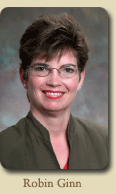 The
SOM has appointed Robin Ginn as the new Executive Director
and David McLean, Jr. as Associate Director of the Clini-cal
Trials Office. This important move will make the SOM's clinical
trials process more efficient, centralize operations, and expand the number
of trials available to patients.
The
SOM has appointed Robin Ginn as the new Executive Director
and David McLean, Jr. as Associate Director of the Clini-cal
Trials Office. This important move will make the SOM's clinical
trials process more efficient, centralize operations, and expand the number
of trials available to patients.
Ms. Ginn comes to Emory from Vanderbilt,
where she was executive director of research informatics and regulatory
affairs. She also has nursing, management, and information systems experience.
Mr. McLean comes here from St. Joseph's
Hospital, where he was the Institutional Review Board Administrator. As
an attorney, Mr. McLean will have a particular focus on directing clinical
trial pre-awards and providing budget negotiation and Medicare coverage
analysis to ensure appropriate billing.
TOP
Thomas J. Lawley, MD
Dean, Emory School of Medicine
TOP
Current Issue • Past Issues • SOM Home
Contact Us • Give a Gift
Copyright © Emory University, 2007. All Rights Reserved